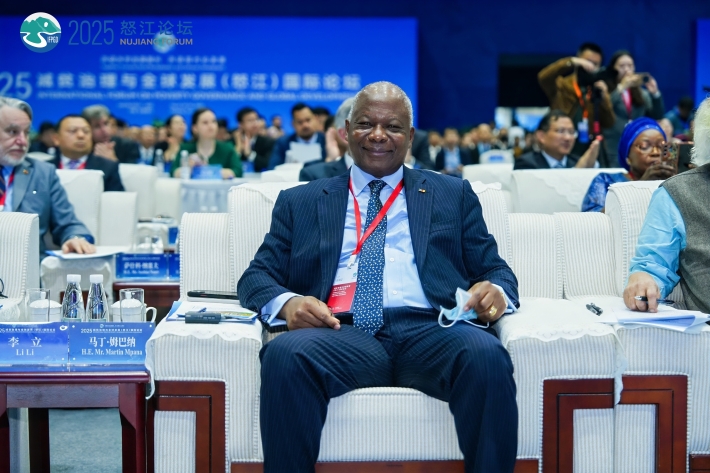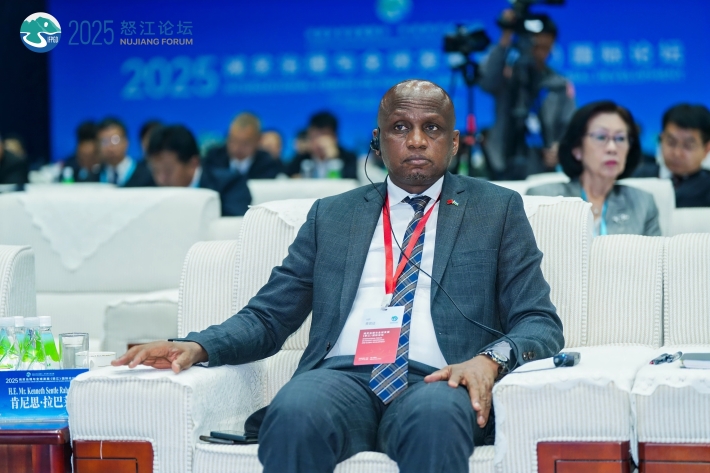|
||||||||||
| Home Top News Economy/Tech Culture/Sports China in Foreign Eyes Green Development Videos Intangible Cultural Heritages |
|
||||||||||
| Home Top News Economy/Tech Culture/Sports China in Foreign Eyes Green Development Videos Intangible Cultural Heritages |
| ChinAfrica |
| Productive Lessons |
| African ambassadors reflect on Nujiang’s poverty reduction strategies |
| ChinAfrica | VOL. 17 May 2025 ·2025-05-06 |

Local villagers stage a traditional ethnic song and dance performance for tourists in Qiunatong Village, Gongshan County, Nujiang Lisu Autonomous Prefecture, Yunnan Province, on 28 March (HU JUN)
Diplomats, government officials, and experts from 34 countries and regions shared experiences in poverty reduction during the 2025 International Forum on Poverty Governance and Global Development held on 29 March in Lushui City, Nujiang Lisu Autonomous Prefecture, Yunnan Province. They discussed pathways to advance sustainable development and promote comprehensive rural revitalisation and modernisation.
During the forum, ChinAfrica reporters Xia Yuanyuan and Donatien Niyonzima spoke with Cameroon’s ambassador to China, Martin Mpana, and Lesotho’s ambassador to China, Kenneth Sentle Rabale, about the applicability of Nujiang’s experiences to poverty alleviation efforts in African nations.

MARTIN MPANA, Cameroonian Ambassador to China
Focus on ethnic culture
The anti-poverty work in southwest China’s Yunnan Province demonstrates the importance of tailoring poverty alleviation strategies to local conditions while respecting cultural traditions, Cameroonian Ambassador to China Martin Mpana said during a visit to the province’s Nujiang Lisu Autonomous Prefecture, noting that China’s poverty reduction strategies prioritise respect for ethnic minority cultures - a model he believes could inspire Cameroon’s efforts to support indigenous communities like the Pygmies.
Mpana stressed the need for the integration of cultural preservation into development: “In Nujiang, ethnic minorities maintain and develop their traditions while benefitting from modern infrastructure and education. This balance ensures their identities aren’t erased by progress.”
Reflecting on the challenges faced by indigenous communities in Cameroon, Mpana highlighted the difficulty in reaching their remote habitats. “Those people need to be educated and assisted in their development,” he stressed.
Drawing parallels between Cameroon’s Pygmy communities, who face isolation due to their nomadic lifestyles and rainforest habitats, and Yunnan’s ethnic minorities, he said, “Like China’s ethnic groups, our Pygmies need tailored support. Infrastructure must reach them without disrupting their culture. Education should strengthen, not displace, their traditions,” he noted. Cameroon could adopt China’s people-oriented approach, which avoids one-size-fits-all solutions, he said.
The ambassador underscored the role of infrastructure in fostering inclusivity: “Roads and connectivity here [in China] enable trade and tourism while preserving culture. In Cameroon, similar projects could help Pygmy communities to access markets for their crafts or promote eco-tourism.” He praised China’s focus on “capacity building,” such as training locals to manage sustainable industries rooted in their heritage.
Despite limited financial resources in Africa, the ambassador remains optimistic about the potential for progress. “We wish we could have roads and highways like those in China,” he said, expressing hope for future developments that could enhance connectivity and economic opportunities in Cameroon.

KENNETH SENTLE RABALE, Lesotho’s Ambassador to China
Collaborative method
Calling China’s progress in poverty alleviation a “huge milestone,” Lesotho’s Ambassador to China Kenneth Sentle Rabale praised the country’s significant achievements in poverty reduction over the past decades and highlighted the valuable lessons these efforts hold for African nations.
Rabale noted China’s success in integrating diverse ethnic groups into the development process. “I see China actually reaching out to the villages and smaller communities of different ethnic groups, and really bringing them on board in terms of designing their developmental goals,” he said, adding that this inclusive approach contains a valuable lesson for African countries, which are also home to diverse ethnic groups.
Seeing poverty as a “global challenge” that must be fought “in all its forms,” the ambassador highlighted key elements of China’s strategy. He pointed to the effective use of technology, which has played a “major role” in driving development across sectors like agriculture, tourism, and industrialisation. He also noted the importance of government commitment, proper budget allocation, and effective planning and monitoring.
Rabale affirmed the relevance of China’s specific strategies like industrial development, infrastructure building, and targeted poverty alleviation for Africa. He supported China’s “multi-pronged approach,” comparing the fight against poverty to fighting a war, requiring the use of all available resources. “China [is] doing industrialisation at the same time they are doing technological advancement, they are also targeting specific areas and putting a lot of resources to really help the communities to develop,” he observed, adding that this was done while respecting local ethnic and cultural values.
The ambassador acknowledged Africa faces numerous challenges, including climate change and sometimes a disconnect between central government plans and community needs. However, he believes adopting strategies like China’s targeted approach, which focuses on developing existing local strengths and “characteristic industries” - such as utilising skills people already possess rather than establishing entirely new ventures - could be beneficial. He stressed the importance of participatory approaches where “communities take part in this whole thing” to ensure development addresses their needs.
Looking ahead, Rabale identified technology and infrastructure as key areas for cooperation between China and Africa. “What we can copy or borrow from China is the technological advancement they have,” he said, noting that Africa needs modern technology and the associated technical know-how to accelerate development.
“Commitment, dedication, accountability, responsiveness to challenges, and the ability to work together to alleviate poverty in all its forms,” the ambassador listed the lessons learnt from the forum and China’s experience.
| About Us | Contact Us | Advertise with Us | Subscribe |
| Copyright Beijing Review All rights reserved 京ICP备08005356号-5 京公网安备110102005860号 |